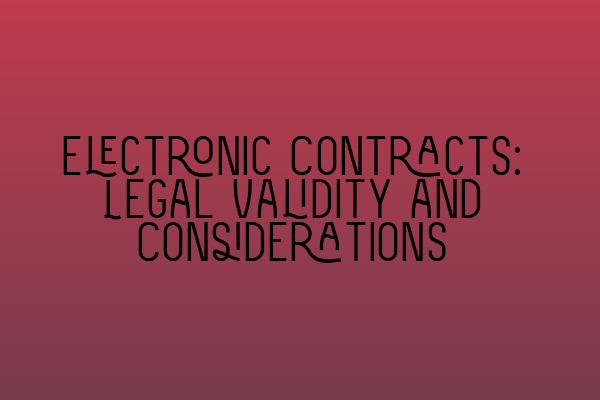Electronic Contracts: Legal Validity and Considerations
In today’s digital age, electronic contracts have become a common method of agreement between individuals and businesses. With the convenience and efficiency they offer, it’s important to understand the legal validity and considerations surrounding these contracts. As a solicitor, I have encountered numerous cases where the enforceability of electronic contracts has been called into question. In this blog post, I will discuss the legal aspects of electronic contracts and provide valuable insights into their validity.
Before we delve into the specific legal considerations, let’s first understand what electronic contracts are. An electronic contract, also known as an e-contract, is a digital agreement formed through electronic means, typically via email, websites, or other online platforms. These contracts can encompass a wide range of transactions, from simple purchase agreements to complex business partnerships.
So, are electronic contracts legally valid? The short answer is yes; they are generally recognized as legally binding agreements in most jurisdictions. However, there are certain factors that need to be considered to ensure their enforceability.
1. Consent and Intent
For any contract to be valid, there must be a mutual consent and intent between the parties involved. This principle applies to electronic contracts as well. It is essential to establish that both parties understood and intended to be bound by the terms of the agreement. This can be achieved through clear and unambiguous language in the contract, as well as obtaining explicit acceptance from each party.
2. Offer and Acceptance
Just like in traditional contracts, electronic contracts require an offer and acceptance. The offer can be made through email, a website form, or even a click of a button. The acceptance is typically indicated by a reply email, ticking a checkbox, or some other form of acknowledgment. It’s important to ensure that the offer and acceptance are properly recorded and exchanged to avoid any disputes down the line.
3. Record-Keeping
One of the advantages of electronic contracts is the ease of record-keeping. Unlike paper contracts, electronic contracts can be easily stored and retrieved for future reference. It’s crucial to maintain these records in a secure and accessible manner to protect both parties’ interests and to comply with any legal obligations.
4. Electronic Signatures
Electronic signatures play a significant role in establishing the authenticity and integrity of an electronic contract. They serve as a digital equivalent to a handwritten signature, indicating the intent of the signatory to be bound by the terms of the contract. Various laws and regulations govern the use of electronic signatures, such as the eIDAS Regulation in the European Union and the Electronic Signatures in Global and National Commerce Act (ESIGN Act) in the United States. It’s important to adhere to the specific requirements of these laws to ensure the validity and enforceability of the electronic signature.
5. Legal Requirements and Regulations
While electronic contracts are generally valid, it’s essential to be aware of any legal requirements and regulations that may apply to specific types of contracts or industries. Certain special conditions or formalities may need to be met depending on the nature of the agreement. For example, contracts involving the sale of goods may be subject to specific legislation, such as the Sale of Goods Act. It’s crucial to consult with a solicitor or legal expert who has experience in the relevant field to ensure compliance with all applicable laws and regulations.
In conclusion, electronic contracts are legally valid and enforceable in most jurisdictions. By following best practices, such as ensuring consent and intent, proper offer and acceptance, record-keeping, valid electronic signatures, and compliance with legal requirements and regulations, parties can confidently enter into electronic contracts. As a solicitor, I highly recommend seeking legal advice to ensure that your electronic contracts are properly drafted, executed, and in compliance with all applicable laws.
If you’re interested in learning more about the legal field, I invite you to check out our related articles:
– Mentorship for Aspiring Solicitors: Nurturing Talent in the Legal Field
– Legal Challenges and Pitfalls: Navigating the Complexities of the Legal System
– The GDL (Graduate Diploma in Law): A Pathway to Becoming a Solicitor
– Mastering the Solicitor’s Path: Prepare for the Journey Ahead
– The Benefits of Becoming a Solicitor: A Rewarding Career
I hope you found this blog post informative and helpful. If you have any further questions or require legal assistance regarding electronic contracts, please do not hesitate to contact us.
